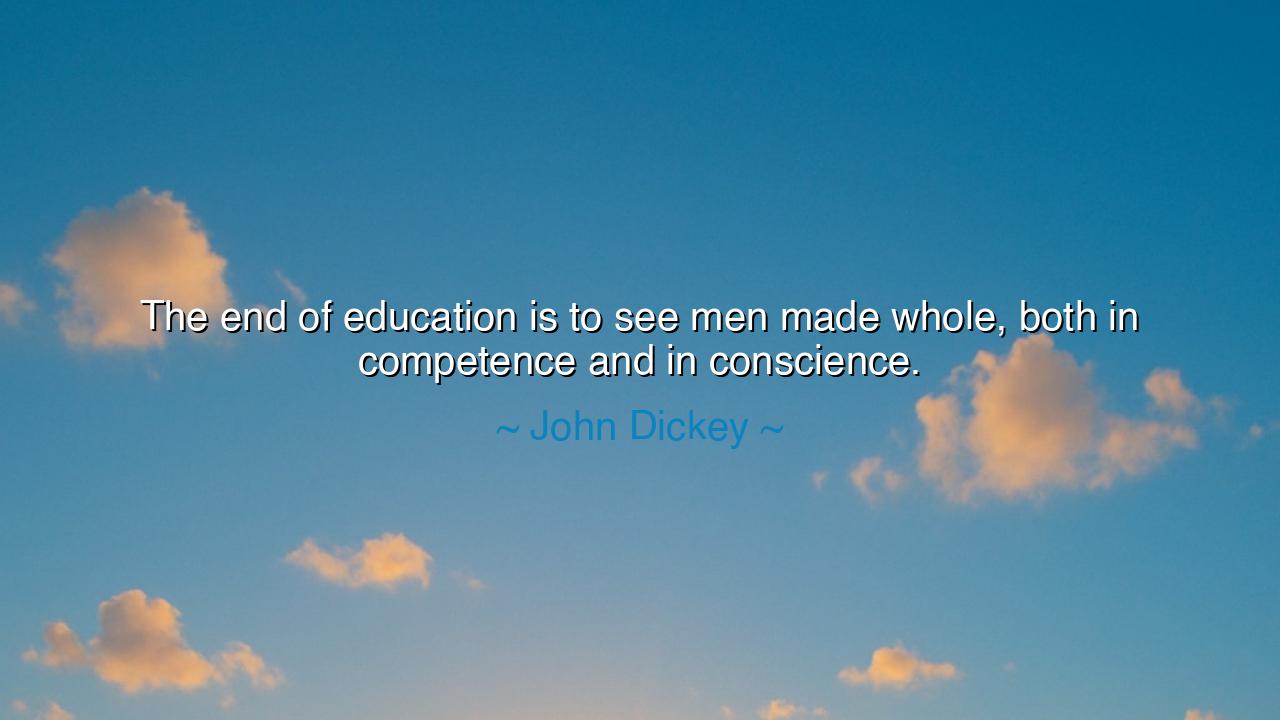
The end of education is to see men made whole, both in competence






Hear the words of John Dickey, who proclaimed: “The end of education is to see men made whole, both in competence and in conscience.” This saying, though simple, is as profound as any carved in stone by the sages of old. For it reminds us that true education does not merely craft skilled hands or sharpen clever minds—it shapes entire beings. It is not enough to be capable; one must also be good. Not enough to achieve; one must also discern right from wrong. Only when competence is joined with conscience can a person be called truly whole.
The ancients spoke often of this union. Plato, in his Republic, declared that the aim of learning was not just to train the intellect, but to form the soul toward justice. He warned of men who are clever in calculation yet corrupt in heart, dangerous to themselves and to the city. So too does Dickey echo this truth: that an education without conscience breeds cunning tyrants, while conscience without competence leaves the world with noble but powerless dreamers. Wholeness is the marriage of the two.
Consider the lives of those who exemplified this union. Think of Mahatma Gandhi, educated in law, skilled in argument and reason—yet he bound his competence to a higher conscience, using his learning not for wealth or domination, but for truth and justice. With both sharp mind and moral compass, he led millions without raising a sword. His life shows that the true purpose of education is not self-exaltation, but service to the greater good.
Yet history also warns us of the opposite. The architects of cruelty in the twentieth century—men who designed weapons of mass destruction, systems of oppression, or efficient machines of war—were not ignorant. Many were highly trained, masters of science and administration. They had competence, but no conscience. And so their brilliance became poison, their skills instruments of devastation. Their example stands as a stark reminder: without the balance of conscience, knowledge itself may become a curse.
Dickey’s words remind us, too, that wholeness is not bestowed by a diploma. It is the fruit of an education that awakens both the mind and the heart. The classroom must not only instruct in mathematics and language, but also cultivate compassion, responsibility, and justice. The forge of learning must temper character as surely as it sharpens intellect. This is the true “end” of education—not simply a career, not merely success, but human beings who live wisely and rightly.
The lesson is clear. If you are a student, strive not only to master your craft, but to ask: “What good shall I bring to the world with this knowledge?” If you are a teacher, remember you are shaping not only competence but conscience; your task is not only to inform, but to inspire. If you are a parent or a leader, seek not just brilliance in those you guide, but integrity, kindness, and courage.
Practical action follows from this truth: pursue learning in your field with diligence, but never neglect the shaping of your inner life. Read not only books of science and skill, but also those of wisdom and virtue. Practice your craft with excellence, but bind it always to the service of justice and compassion. For in this way, you will grow not as a fragment, but as a whole.
So remember John Dickey’s words: the true end of education is not merely knowledge, not merely skill, but men and women made whole—strong in competence, steadfast in conscience. To be such a person is to be a pillar of society, a guardian of truth, and a light for generations to come. Let this be your aim, and in striving for it, may you help build a world both wise and good.






AAdministratorAdministrator
Welcome, honored guests. Please leave a comment, we will respond soon